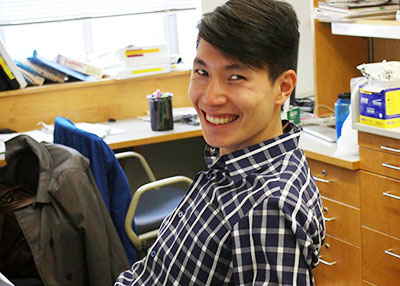Questions asked about new “gay DNA saliva test”

Dr. Tuck Ngun has now left the project
One of the scientists behind a controversial new “gay test” has dropped out of the research over its ethical implications.
The scientists claim they can predict the sexual orientation of males with up to 70 percent accuracy, with a saliva test that uses epigenetic information from nine regions of the human genome.
The research was presented last week at the American Society of Human Genetics 2015 Annual Meeting in Baltimore by Tuck C. Ngun, lead author on the study and a postdoctoral researcher at the University of California, Los Angeles.
“To our knowledge, this is the first example of a predictive model for sexual orientation based on molecular markers,” said Ngun in a press release.
The study involved 37 pairs of twins in which one twin was homosexual and the other was heterosexual, and 10 pairs in which both twins were homosexual. All the subject were adults.
The researchers claim that by studying changes to the subject’s DNA due to external or environmental influences (known as epigenetics), they could predict the participants’ sexual orientation with 70 percent accuracy.
While no specific gay gene has yet been discovered many scientists believe that complex environmental or other factors in the womb (such as hormones) may switch genes on and off or affect how cells read genes, resulting in some children having a tendency to be gay.
This could explain why some twins, who have the same basic DNA structure, may be different when it comes to sexual orientation.
“Sexual attraction is such a fundamental part of life, but it’s not something we know a lot about at the genetic and molecular level. I hope that this research helps us understand ourselves better and why we are the way we are,” Ngun said.
According to Gay Star News, however, the scientist, who is himself gay, has since left the project as concern grows that tests could be developed in the future to screen gay children before they are born.
“Any practical outcomes (tests, screens, etc.) may be many years/decades in the future but the idea that I was contributing to that, even in a tiny way, didn’t sit right with me anymore,” Ngun said.
“I want to make clear that I don’t believe in the censorship of information but on a personal level, I could not continue down this path.”
A number of scientists have also questioned the results of the research, the small number of subjects that took part, as well as the methods used.
“There are many reasons why this study is uninterpretable,” wrote John Greally from the Albert Einstein College of Medicine in a blog post.
He pointed out that there were serious concerns with the way the researchers interpreted the results of the study and the conclusions they came to.
Greally slammed the American Society for Human Genetics’ review process “that permitted this study to get accepted for presentation.”
LGBT rights campaigner Peter Tatchell told Daily Mail that, “Some people fear the research might be abused by homophobic parents or regimes to test and abort foetuses that have genetic markers for homosexuality.
“Even if the tests achieved the maximum 70 per cent detection rate, it would still leave 30 per cent undetected.
“Any bid to exploit this research for homophobic ends is doomed to fail. Homosexuality has existed in all societies and all eras. It is part of the natural spectrum of human sexuality,” he said.
Leave a Reply